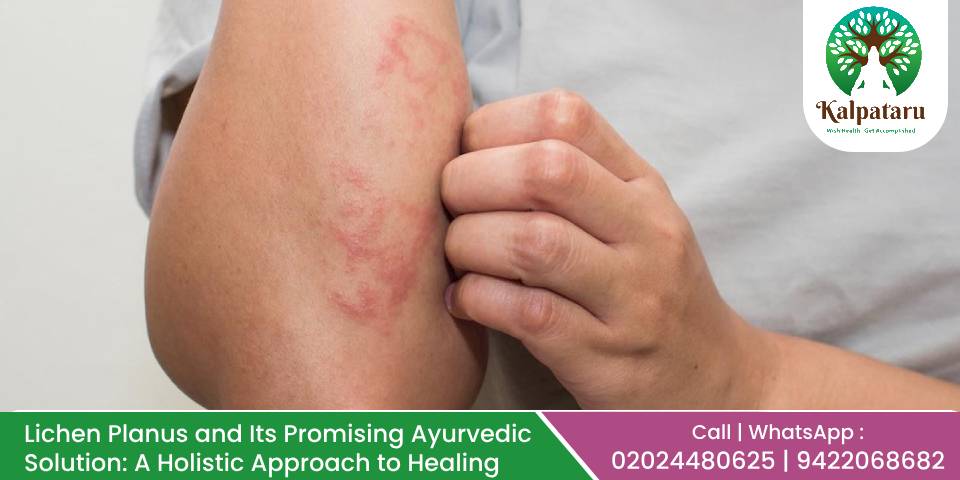Lichen planus is a chronic inflammatory skin condition that affects millions of individuals worldwide. It is characterized by the appearance of itchy, flat-topped, purplish bumps or lesions on the skin, mucous membranes, scalp, and nails. While the exact cause of lichen planus remains unknown, it is believed to be an autoimmune disorder that occurs when the immune system mistakenly attacks healthy cells.
In the pursuit of effective remedies for lichen planus, Ayurveda has emerged as a promising holistic approach that aims to address the root cause of the condition and provide long-lasting relief. Kalpataru Ayurvediya Chikitsalaya™, with its renowned Ayurvedic doctors, Dr. Manoj Deshpande and Dr. Aparna Deshpande, has established itself as a trusted destination for individuals seeking comprehensive and reliable Ayurvedic solutions.
Understanding Lichen Planus in Ayurveda:
According to Ayurveda, lichen planus is classified as a “Kushtha”( In ayurvedic terminology every skin disease is broadly called as kustha)disorder, primarily associated with an imbalance of the “Pitta” and “Vata” doshas. The accumulation of toxins, known as “Ama,” weakens the immune system and disrupts the body’s natural equilibrium, leading to the manifestation of skin lesions and other symptoms.
Ayurvedic Treatment Approach:
- Detoxification and Purification (Panchakarma): Panchakarma, a cornerstone of Ayurvedic therapy, involves the systematic removal of toxins from the body. The treatment includes procedures like Virechana (therapeutic purgation) and Vamana (therapeutic emesis) to eliminate Ama and restore the balance of doshas. These processes not only help in the detoxification of the body but also rejuvenate the immune system.
- Herbal Medications: Ayurvedic herbs play a vital role in managing lichen planus. The experienced Ayurvedic doctors at Kalpataru Ayurvediya Chikitsalaya™ prescribe herbal formulations tailored to individual needs. Some commonly used herbs for lichen planus include Neem (Azadirachta indica), Giloy (Tinospora cordifolia), Turmeric (Curcuma longa), Manjistha etc. These herbs possess anti-inflammatory, immunomodulatory, and skin-healing properties, providing relief from itching, reducing inflammation, and promoting the regeneration of healthy skin cells.
- Diet and Lifestyle Modifications: Ayurveda emphasizes the importance of a balanced diet and lifestyle modifications in managing lichen planus. Patients are advised to avoid spicy, sour, and fried foods, as well as alcohol and tobacco. Instead, they are encouraged to consume fresh fruits, vegetables, and whole grains. Additionally, stress management techniques such as yoga, meditation, and regular exercise are recommended to promote overall well-being and support the healing process.
- External Therapies: External therapies are an integral part of Ayurvedic treatment for lichen planus. Local application of medicated oils, ointments, and pastes can help soothe the skin, reduce itching, and promote the healing of lesions. Panchakarma procedures like “Takradhara” (pouring medicated buttermilk) and “Avagaha Swedana” (herbal steam baths) are also beneficial in providing symptomatic relief.
For more information and treatment modalities watch our informative video
Conclusion:
Lichen planus can be a distressing condition, but Ayurveda offers a promising holistic solution that goes beyond mere symptom management. The approach of Kalpataru Ayurvediya Chikitsalaya™, guided by the expertise of Dr. Manoj Deshpande and Dr.Aparna Deshpande, focuses on addressing the underlying imbalances in the body, detoxification, and promoting overall well-being. By combining personalized Ayurvedic treatments, herbal medications, diet modifications, and lifestyle adjustments, patients can experience significant relief from the symptoms of lichen planus and support the healing process.
It is important to note that Ayurvedic treatments should be undertaken under the guidance and supervision of qualified Ayurvedic doctors, as they have the knowledge and expertise to tailor treatment plans according to individual needs. If you or someone you know is struggling with lichen planus, consider exploring the holistic approach of Ayurveda and consulting with experienced Ayurvedic practitioners to find a personalized solution that works best for you.
Remember, Ayurveda aims not only to alleviate the symptoms but also to promote overall well-being and restore balance to the body, mind, and spirit. With the right guidance and dedication, lichen planus can be managed effectively, allowing individuals to regain control of their health and lead a fulfilling life.
Final tips- Dietary management like restricting dairy products, bakery products, junk food is of utmost importance. With holistic management by ayurveda, we can stop the need of consuming steroids on local and systemic use.

